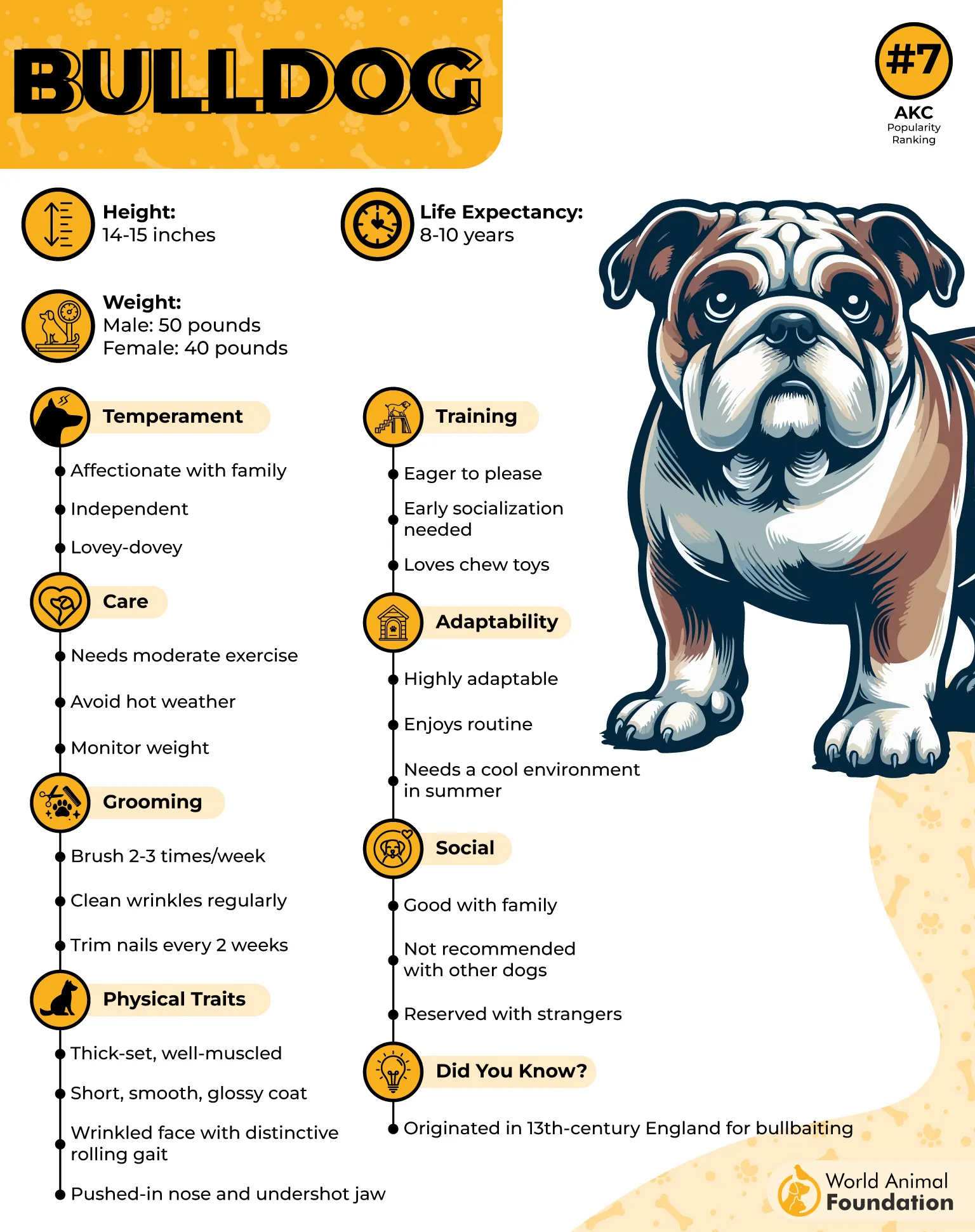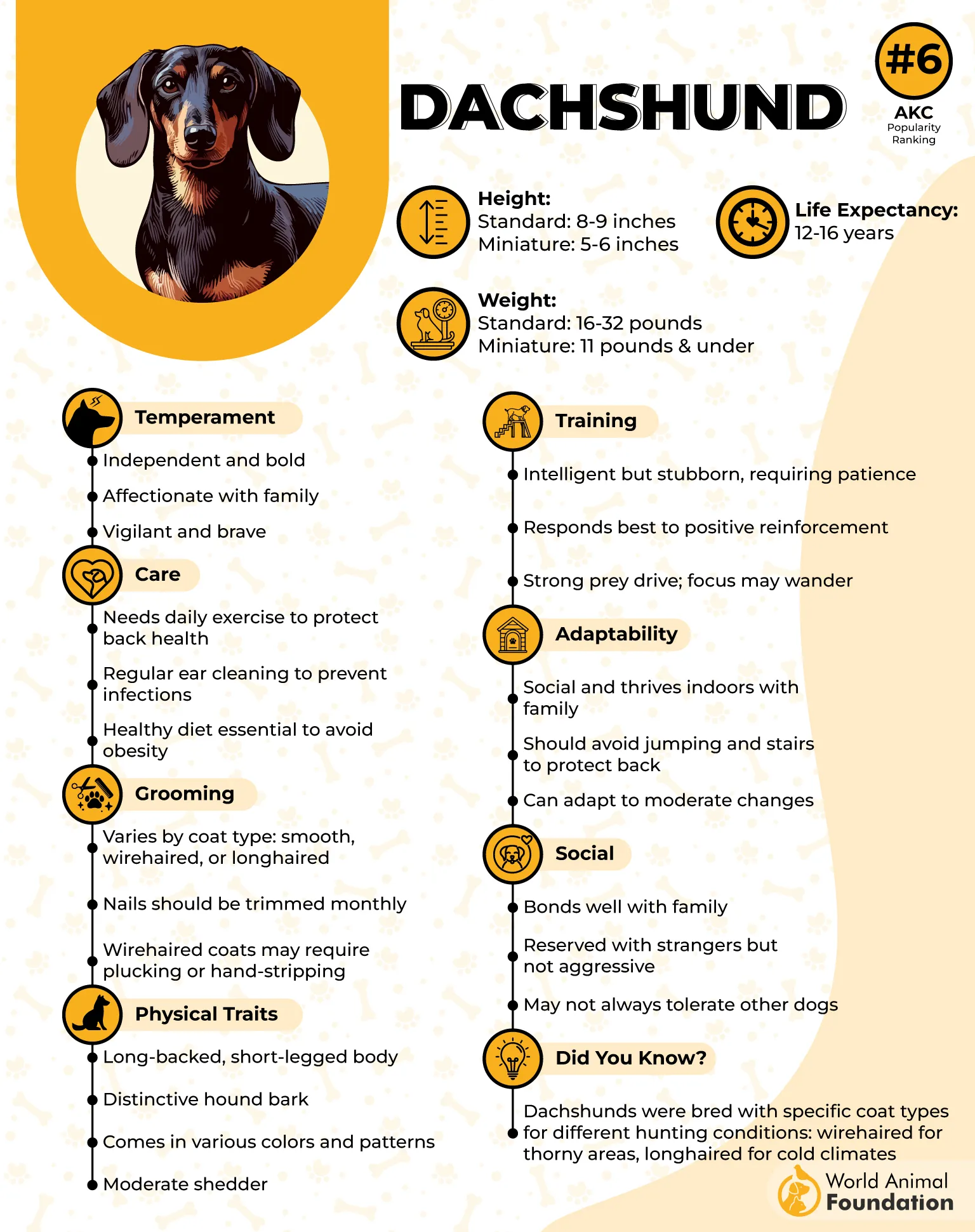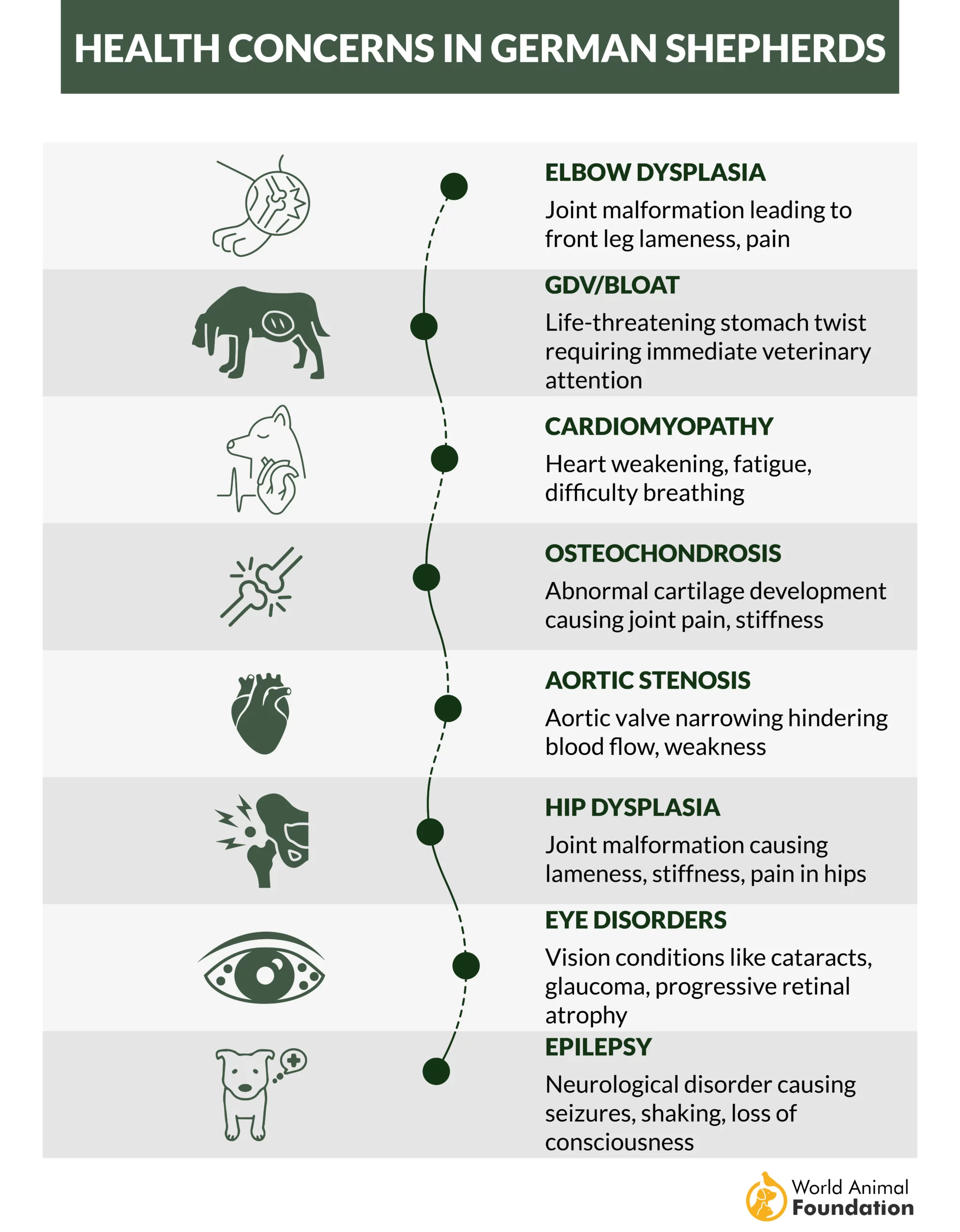They may be charming, cuddly, and Insta-famous—but some dog breeds come with a baggage of health concerns, including breathing difficulties, that can be tough for owners to manage. From breathing problems to joint issues, it’s important to know what you’re signing up for before falling for those big puppy eyes.
Breeds like Bulldogs, Pugs, and Dachshunds often suffer from hereditary issues that require extra care, vet attention, and sometimes expensive treatments. Loving them means being informed, proactive, and ready to support their unique needs.
We’ll explore the most popular dog breeds prone to health problems and what you can do to care for them. Whether you already have one of these pups or are considering adopting, understanding their vulnerabilities and breed-specific concerns can make a world of difference in their lives—and yours.
Dog Breeds Prone to Health Issues
1. Bulldog

Bulldogs are the embodiment of “adorable awkwardness.” With their wrinkled faces, stocky builds, and a walk that looks like they’ve just had a little too much to eat, they’re impossible not to love. But let’s be real — those adorable wrinkles can also mean some not-so-adorable health problems.
Health Issues
Brachycephalic Airway Syndrome: According to Britannica, Bulldogs are prone to a higher number of health issues, largely due to their short muzzle and flattened facial structure. These brachycephalic dog breeds have short snouts, which gives them that lovable, squished face. But it also means they can have difficulty breathing, especially in hot weather or after a lot of exercise.
Hip Dysplasia: They might not be the most athletic dog, but Bulldogs are at higher risk of hip problems, which can make their daily walks a little less fun. Always keep an eye on their movements and consult the vet if you notice them limping or struggling to get around.
Skin Infections: Those adorable skin folds are a breeding ground for bacteria. Bulldogs are often prone to infections in their wrinkles, especially if they’re not kept clean and dry. You might find yourself doing a little “skin fold maintenance” to keep your Bulldog happy.

But despite all these potential health hiccups, Bulldogs are famously affectionate and lazy — they love nothing more than cuddling up on the couch with you. So, while you might need to baby-proof your Bulldog’s health, they’ll return the favor with their endless love and those adorable squishy faces.
According to the American Kennel Club (AKC), don’t mistake Bulldogs’ easygoing nature for laziness—they enjoy brisk walks and require regular moderate exercise, along with a careful diet, to maintain a healthy weight.
2. Dachshund

Dachshunds, or “wiener dogs” as they’re often affectionately called, are small but mighty. They’ve got the spunk and sass to match their tiny size, but unfortunately, their long bodies and short legs can sometimes cause more than a few health issues.
Their sausage-like frame and expressive almond-shaped eyes are instantly recognizable. With sleek or wire-haired coats and ears long enough to catch gossip from three blocks away, they strut with purpose, even if they’re only 9 inches tall.
Health Issues
Intervertebral Disc Disease (IVDD): The Dachshund’s long, elegant spine is its most charming feature, but it’s also its greatest vulnerability. Their spines are prone to disc problems, which can lead to back pain, weakness, and even paralysis in severe cases.
Obesity: Those big eyes can melt anyone’s heart, but they can also get your Dachshund a few extra treats. With their small frame, it doesn’t take much for Dachshunds to pack on the pounds, which can exacerbate back and joint problems.
Dental Problems: This one is a little less obvious but just as important. Dachshunds can have dental issues, so regular tooth brushing (and maybe even some dental treats) will help them avoid a lifetime of doggy breath and painful teeth.

Despite all their health quirks, Dachshunds are energetic, loyal, and charming companions who are always up for an adventure. They might need a little extra care, but the love they give is well worth it.
Purina says that due to their stubborn and independent nature, Dachshunds can be challenging to train. The key to success is patience, consistency, and using positive, reward-based training methods.
3. German Shepherd

Majestic and muscular, the German Shepherd is the definition of canine nobility. With a chiseled face, upright ears, and that iconic saddle-like pattern across their dense double coat, these purebred dogs look like they’re ready to guard the crown jewels — or your backyard. Every step is confident, precise, and says, “Don’t worry, I got this.”
Whether they’re sniffing out bad guys or herding sheep, they’ve got a lot of energy and drive. However, all that action comes with a few health issues that could put a damper on their crime-fighting (or fetch-playing) abilities.
Health Issues
Hip Dysplasia: This is one of the most common issues faced by German Shepherds. Their large, muscular build puts extra strain on their joints, leading to hip problems. It’s like they’re born to be active, but their hips might not always cooperate.
Elbow Dysplasia: Not just their hips — German Shepherds are also prone to elbow dysplasia. Their joints don’t always develop correctly, which can cause arthritis and pain.

Degenerative Myelopathy (DM): This is a nerve disease that affects the spinal cord and can lead to weakness and even paralysis. It’s a tough condition, but early detection can help you manage it with physical therapy and lifestyle changes.

Despite these issues, German Shepherds are usually robust, strong dogs, and they’re incredibly devoted to their families. With the right care, they’ll continue to be your loyal, four-legged hero for years to come!
4. Labrador Retriever
With their big brown eyes, wagging tail, and thick, waterproof coat, Labs are the friendly neighbor of the dog world. Strong yet soft, their athletic build and “I’m ready for fetch 24/7” energy make them look like the star quarterback in high school — if the quarterback also drooled a little and chased butterflies for fun.
As noted by WebMD, they’re called gun dogs because they were originally bred to retrieve game animals shot by hunters, which makes them excellent hunting partners.

These mixed-breed dogs are known for their boundless energy, friendly demeanor, and love of food. Seriously, if you have a Labrador, you know that a treat is never far from their mind. But with all that enthusiasm for life (and food), Labs are also prone to a few health concerns, including kidney disease, that owners should keep an eye on.
Health Issues
Hip and Elbow Dysplasia: Like their German Shepherd cousins, Labradors can suffer from hip and elbow dysplasia. Their large size and active lifestyle put pressure on their joints, making them prone to these issues.
Obesity: Labs are notorious for having a bottomless pit of a stomach. They’ll eat anything, and that enthusiasm can lead to obesity if not carefully managed.
Progressive Retinal Atrophy (PRA): This is a genetic condition that can lead to vision problems and, eventually, blindness. Thankfully, PRA is slow-progressing, and many Labs can adapt to the changes in their vision, but it’s still something to be mindful of as your Lab ages.
Gastric Dilatation-Volvulus (Bloat): Labs are enthusiastic eaters, and sometimes that leads to a potentially dangerous condition known as bloat. This occurs when the stomach fills with gas and twists, which can cut off blood flow and cause severe pain.
While these health issues might sound a little concerning, Labs are generally hardy and happy dogs. Their lovable, carefree nature makes them one of the most popular breeds worldwide. As long as you keep them active, engaged, and healthy, they’ll be your best friend for years to come.
5. Cocker Spaniel
Cocker Spaniels are like the gentle, soft-eyed companions you just can’t resist. With their long ears and flowing coats, they’re pure doggy elegance.
They’re medium-sized but carry themselves like royalty, with every head tilt and paw tap brimming with charm and maybe a hint of melodrama. But while they may look like the picture of perfection, they have a few health issues that require attention, especially when it comes to their ears.
Health Issues
Ear Infections: Those long, floppy ears are one of the Cocker Spaniel’s most endearing features, but they also create the perfect environment for bacteria and yeast to thrive. Regular ear cleaning is essential to keep things from getting too “floppy” in there.
Progressive Retinal Atrophy (PRA): Like many breeds, Cocker Spaniels are prone to this genetic condition that can lead to gradual vision loss. While this doesn’t typically cause blindness overnight, it’s important to monitor their sight and get them checked regularly, especially as they age.
Hip Dysplasia: Though not as common as in larger breeds, Cocker Spaniels are still susceptible to hip dysplasia, which can lead to arthritis and mobility issues.
Cherry Eye: This condition occurs when the gland in the dog’s third eyelid becomes swollen and visible. It’s more of a cosmetic issue than a health emergency, but it can sometimes require surgical intervention if it causes discomfort or prevents proper eye lubrication.
Despite these potential health hiccups, Cocker Spaniels are known for being affectionate, playful, and incredibly loyal. With the right care, these loving companions will be your best friend through thick and thin.
6. Beagle
Beagles are small, energetic, and incredibly curious. With noses that could put Sherlock Holmes to shame, Beagles are excellent trackers and hunters.
Compact, curious, and always sniffing something suspicious, Beagles have a sturdy frame and an irresistible face. Their big floppy ears, tri-colored coats, and pleading eyes give them an eternal “but I’m innocent” expression — even when they’ve just raided your trash bin. Tail always up, nose always down — that’s the Beagle motto.
But like any dog, their love for adventure sometimes leads to health problems, such as urinary tract infections, that owners should watch out for. If you’ve got a Beagle, get ready for some fun (and occasionally frustrating) health challenges.
Health Issues
Hip Dysplasia: Beagles may be small, but they’re still prone to hip dysplasia. This joint issue occurs when the ball and socket don’t fit together perfectly, causing pain and arthritis.
Epilepsy: Beagles are one of the breeds that are more likely to develop epilepsy, which can cause seizures. While it can be managed with medication, it’s definitely something you’ll need to keep an eye on.
Hypothyroidism: Beagles can develop hypothyroidism, where their thyroid gland doesn’t produce enough hormones. This can lead to weight gain, lethargy, and skin issues. If your Beagle seems unusually tired or is gaining weight despite an active lifestyle, a quick blood test can help identify any thyroid problems.
Intervertebral Disc Disease (IVDD): Beagles, like many other dogs, are at risk for back problems. IVDD occurs when the discs in the spine degenerate or slip, leading to pain, weakness, and sometimes even paralysis.
Beagles are known for their friendly, laid-back personalities and their strong nose. With their gentle nature, they make fantastic family dogs and always keep you on your toes with their sense of adventure. A little extra care can ensure that your Beagle stays as happy and healthy as they are playful.
7. Boxer
Boxers are known for their boundless energy, goofy antics, and that adorable squished face that just makes you want to give them a belly rub. They’re fun-loving and always up for a game, but with all that excitement comes some health issues that their owners need to keep an eye on.
With their athletic build and boundless energy, Boxers are the jocks of the dog world. These medium-to-large dogs have strong, muscular frames, perfect for their playful nature. Their short coat, often fawn or brindle, is sleek and smooth, showcasing their powerful physique.
Health Issues
Hip Dysplasia: Boxers, being a medium-to-large breed, are at risk for hip dysplasia. This happens when the hip joint doesn’t develop properly, which can lead to arthritis and pain.
Heart Problems: Boxers are prone to heart conditions, particularly dilated cardiomyopathy, which affects the heart’s ability to pump blood. They might appear lethargic or have difficulty breathing if the condition progresses.
Cancer: Unfortunately, Boxers are one of the breeds more prone to developing cancer, especially mast cell tumors and lymphoma.
Bloat (Gastric Dilatation-Volvulus): Boxers can be susceptible to bloat, a condition where the stomach fills with gas and twists. Signs of bloat include a bloated stomach, excessive drooling, and restlessness.
Despite these potential health concerns, Boxers are incredibly affectionate, playful, and always ready to make you laugh. Their loyalty and joy make them one of the most beloved breeds, and with the right care, they’ll keep you on your toes with their fun-loving nature.
Conclusion
While all dogs deserve love and care, some dog breeds are more prone to health issues than others due to genetics and size. Breeds like Cavalier King Charles Spaniel and Golden Retrievers are well-loved for their friendly nature, but are also known for specific health conditions such as heart problems and joint issues. Being aware of these common health concerns is essential for responsible dog owners.
Maintaining a healthy weight, providing a balanced diet, and ensuring regular exercise can help manage or even prevent some dog health issues. Older dogs and small dogs alike need tailored care, from monitoring a dog’s teeth to watching for changes in the dog’s body as it ages. Understanding your dog’s age and needs helps guide proper nutrition and activity levels.
To manage breed-related health problems, regular checkups with a professional in veterinary medicine are crucial. Regular vet visits allow early detection and treatment of issues before they become severe. Whether you’re considering other dog breeds or already own one with known risks, staying informed and proactive, including exploring pet insurance plans, is key to ensuring a longer, healthier life for your furry friend.


